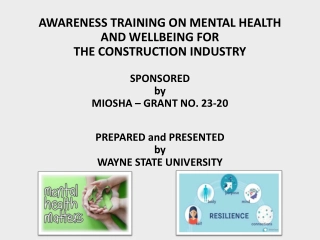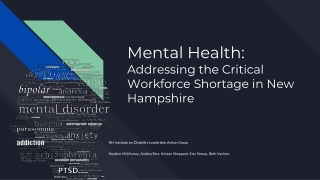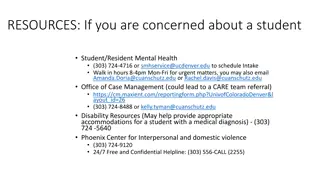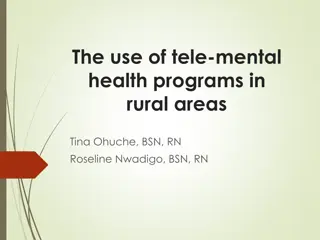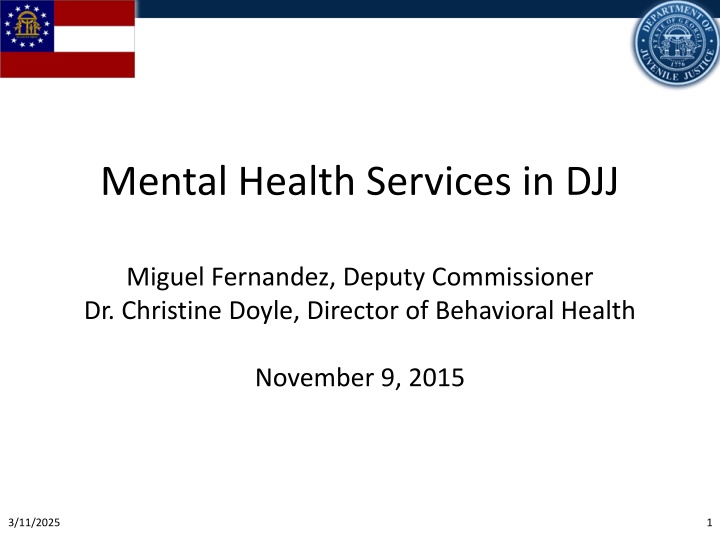
Mental Health Services in DJJ Overview
Georgia Department of Juvenile Justice (DJJ) provides mental health services through various facilities. The organizational chart outlines the structure of DJJ, including divisions responsible for behavioral health services, health services, classification, assessment, transportation, and training.
Download Presentation

Please find below an Image/Link to download the presentation.
The content on the website is provided AS IS for your information and personal use only. It may not be sold, licensed, or shared on other websites without obtaining consent from the author. If you encounter any issues during the download, it is possible that the publisher has removed the file from their server.
You are allowed to download the files provided on this website for personal or commercial use, subject to the condition that they are used lawfully. All files are the property of their respective owners.
The content on the website is provided AS IS for your information and personal use only. It may not be sold, licensed, or shared on other websites without obtaining consent from the author.
E N D
Presentation Transcript
Mental Health Services in DJJ Miguel Fernandez, Deputy Commissioner Dr. Christine Doyle, Director of Behavioral Health November 9, 2015 3/11/2025 1
Overview of Georgia DJJ Facilities 26 secure facilities in Georgia: 7 Youth Development Campuses (YDCs) 19 Regional Youth Detention Centers (RYDCs) Facility Capacities: 80-150 beds in YDCs 30-200 beds in RYDCs Approximately 1,400 youth in detention on a given day 850 RYDC 550 YDC 3/11/2025 2
DJJ Organizational Chart Avery D. Niles Commissioner AssistantCommissioner AssistantCommissioner Chief of Staff ChiefFinancial Officer LegislativeLiaison Assoc. Suptof Schools Office of Education & Re-EntryServices Special Assistant to the Commissioner Director Legal Services Deputy Commissioner Operations & Compliance Deputy Commissioner Administrative Services Deputy Commissioner SupportServices Deputy Commissioner CommunityServices Deputy Commissioner SecureFacilities Special Operations Assistant Deputy Commissioner AssistantDeputy Commissioner Assistant Deputy Commissioner Assistant Deputy Commissioner Assistant Deputy Commissioner Office of Victim & VolunteerServices HealthServices Regional Offices (x4) InterstateCompact Program Coordinators (PREA, Gangs, Intel Analysts) Grants,Real Estate Management & StrategicPlanning Office of Continuous Improvement Regional Administrators(x4) Behavioral Services Training Placements/RPS ChaplaincyServices RYDC s(x19) Engineering DistrictOffices (x11) Office of the Ombudsman Classification & Transportation Property Management Policy Coordinator YDC s (x8) Contracts Office of Planning & Preparedness Technology & Information Services CourtServicesOffices (x92) Director Director Investigations/ Intelligence Case Expediters Director Communications/ Media Human Resources 3/11/2025 3
Division Offices Office of Behavioral Health Services Director Dr. Christine Doyle Office of Health Services Director Benjamin Harvill, LNHA Office of Classification, Assessment and Transportation Services Director Lisa Casey-Bryson Office of Training Director Christopher Thomas 3/11/2025 4
1998 OBHS was established as a part of the Memorandum of Agreement (MOA) with the U.S. Department of Justice Required DJJ to develop resources, policies and systems for: Staffing and training Screening and Assessment Treatment Planning and service provision Alternative placement for youth with severe emotional disturbance Suicide Prevention Quality Assurance and Monitoring 3/11/2025 5
Behavioral Health Services Oversight of Mental Health & Substance Abuse Services is provided by the Office of Behavioral Health Services Every secure facility has a Mental Health treatment team consisting of: Master s level mental health clinicians Psychiatrist Psychologist Registered Nurse Substance Abuse Counselors (YDC only) 3/11/2025 6
Eligibility for MH Services 1. Youth currently displays symptoms and behaviors of an emotional disturbance of at least moderate severity as indicated by any one of the following: Suicidal thoughts / behavior and/or self-injurious behavior; Psychosis (hallucinations, delusions and/or paranoia); Mood problems (depressed mood, feelings of worthlessness and/or manic thought/behavior) Anxiety (anxiety/panic attacks, phobias, obsessions/compulsions) Trauma history with symptoms of acute- or post-traumatic stress disorder. 3/11/2025 7
Eligibility for MH Services 2. Youth needs to take medication for the treatment of a psychiatric disorder 3. The treatment team determines that there is a need for mental health services on an ongoing basis to enhance the youth s ability to cope with confinement 4. Youth previously receiving services and is no longer displaying a moderate level of disturbance, but it is likely that he/she would regress to that level if services were discontinued 5. Youth is being evaluated for competence to stand trial. 6. Youth is referred to the Behavioral Health Placement Review Panel 3/11/2025 8
How Youth Access Services Mental Health, Substance Abuse & Suicide Risk Screening within 2 hours of each admission 99% of youth admitted were screened within timeframe (11,720) 58% of those screenings resulted in referral for MH assessment (6,772) Help Request Process 4,917 requests in FY-2015 Self referral Family or staff referral Crisis Management 24 on-call consultation Suicide Prevention Plans developed & implemented for youth at risk for self-harm Special Management Plans to for youth with severe behavior problems or need protective measures 3/11/2025 9
Mental Health Services Mental Health Assessment youth is assessed by a masters level mental health clinician within 72 hours of referral. YDC Needs Assessment - every youth admitted to a long- term facility receives a comprehensive mental health assessment by a masters-level clinician, during the first 10 days of their placement. Psycho-diagnostic Evaluation (PDE) - every youth who is placed on the MH Caseload receives a PDE by a psychiatrist or psychologist within 10 days. 49% of youth on caseload receive psychotropic medication 3/11/2025 10
Mental Health Services For all youth: Suicide prevention Crisis intervention Special management planning For youth on the mental health caseload: Individual therapy Group therapy Medication management Treatment planning 3/11/2025 11
Mental Health Treatment Program Structured Psychotherapy for Adolescents Responding to Chronic Stress (SPARCS): group treatment for treatment of youth who have experienced multiple traumatic event Trauma Focused Cognitive Behavioral Therapy (TF-CBT): individual treatment for youth who have experienced and have symptoms relating to trauma. New Freedom Treatment Program: cognitive behavioral-based content for 14 core mental health problem areas 3/11/2025 12
Mental Health Treatment Program EQUIP group treatment program for treatment of behavioral disorders. Uses positive youth culture and treatment to help youth develop anger management skills, social skills, identify and correct thinking errors, and improve moral reasoning. Seven Challenges: group and individual treatment model for treatment of adolescent substance abuse 3/11/2025 13
Fiscal Year 2015 Services Program Admissions (unduplicated count) Avg. Daily Population Avg. Daily MH Caseload Avg. % Caseload Youth Development Campus (YDC) Regional Youth Detention Center (RYDC) 548 630 311 49% 11,270 775 323 42% 3/11/2025 14
Diagnostic Characteristics of youth receiving on-going MH Services FY-2015 SA Abuse Related Disorder 84% Conduct/ODD Disorder 83% Attention Deficit Disorders 50% Mood Disorders 49% Anxiety and Trauma 27% Impulse Control Disorders 18% Relationship Problems 12% 3/11/2025 15
Diagnostic Characteristics of youth receiving on-going MH Services FY-2015 Abuse or Neglect - Victim Sleep Disorders Abuse or Neglect - Perpetrator MR/Borderline Intellectual Functioning Thought Disorders Personality Disorders Adjustment Disorders 12% 10% 8% 6% 4% 4% 2% 3/11/2025 16
Substance Abuse Services - FY 2015 Number of youth admitted to substance use one or more times per month: 33% of youth at the RYDC 53% of youth at the YDC If a youth is identified as having a substance abuse or dependence diagnosis in the RYDC and is also receiving mental health services, the primary clinician will provide an individual or group intervention 37% of youth at the YDC were identified as having significant SA issues and were referred for RSAT services in FY 2015 YDC Substance Abuse Treatment and Intervention utilizes an evidence based treatment program The Seven Challenges 3/11/2025 17
Specialized YDC Treatment Units Intensive Treatment Unit 30 male beds Mental Health Units Macon YDC 14 female beds Augusta YDC 20 male beds Shelter Care Unit Augusta 20 male beds Residential Substance Abuse Treatment (RSAT) Unit Sumter YDC 25 male beds Atlanta YDC 20 male beds Augusta YDC 20 male beds We have the capacity to serve 130 youth in the RSAT unit annually 3/11/2025 18
Documentation of Services and Managing Care DJJ has an electronic health record within the Juvenile Tracking System (JTS), which allows us to: Provide improved continuity of care among facilities and upon discharge and readmission Track programming trends and needs Prompt planned clinical services Monitor and manage care DJJ has a 95% paperless electronic mental health record. 3/11/2025 19
Challenges Limited treatment resources available in community, especially in rural areas Clinicians often have difficulty linking a youth to the necessary services when they return home Residential provider bias against DJJ youth Sometimes ignore serious mental health issues due to behavior Sometimes ignore serious mental health issues that co-occur with Autism 3/11/2025 20
Challenges Recruiting and retention of qualified staff State-wide lack of qualified mental health staff impacts our ability to recruit Difficulty recruiting in rural areas, especially for licensed clinicians, psychologists, and psychiatrists 3/11/2025 21
Questions? 3/11/2025 22
Contact information: Miguel Fernandez, Deputy Commissioner 404-508-6508 miguelfernandez@djj.state.ga.us Dr. Christine Doyle 404-508-7266 christinedoyle@djj.state.ga.us 3/11/2025 23

